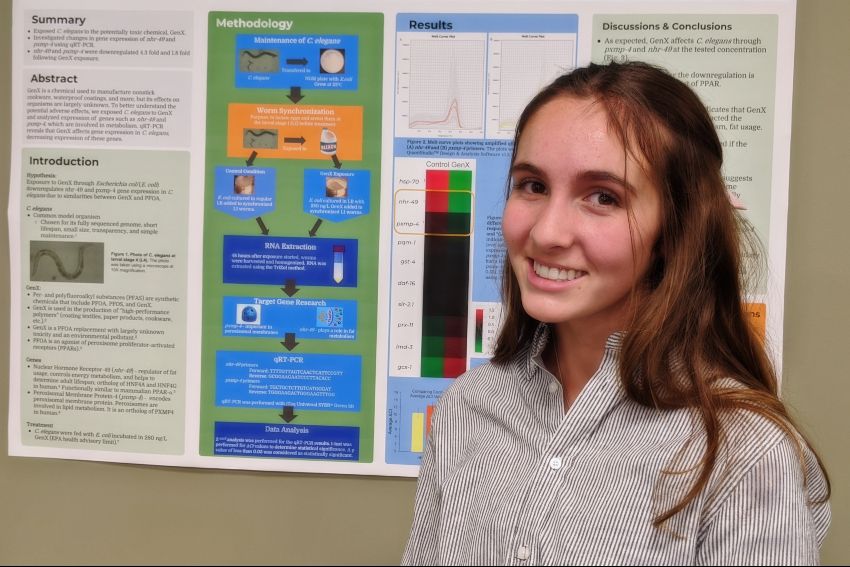24 July 2020
La Jolla High School Junior Explores Coding and Biotech Careers
By Margaret King

Dagny Whall is always looking for a new challenge. In fact, when she decided to take advantage of Futures classes from UC San Diego Extension, she didn't limit herself to one subject; she enrolled in two programs running simultaneously.
Dagny, who will be entering 11th grade at La Jolla High School in the fall, is fascinated by biology, so signing up for the Futures Life Sciences program was a no-brainer. She's not as keen on coding, but she decided to try Futures Front-End Web Development as well.
By immersing herself in both subjects at once, Dagny broadened her thinking on possible careers. "Before I hadn't really considered computer science because I thought it would just be making websites or apps," she says. "But you can combine programming and biology. I began to consider fields like biotechnology and computational biology."
Futures was created by Extension in partnership with industry leaders as a pathway for high school students to master high-demand career skills while earning Extension credits. Courses are grouped under headings like Formulate Your Future for life sciences and Program Your Future for coding. Scholarships are available to cover course costs.
Futures normally offers both in-person and online courses, but because of the coronavirus pandemic, all current offerings are online.
In March, Dagny completed the 5-month Life Sciences program, offered by Extension in partnership with Boz Life Science Research and Teaching Institute. In May, she completed the 8-month Front-End Web Development series.
Dagny has long been interested in biology, so as a freshman, she enrolled in La Jolla High's four-year Biomedical Pathway. "We have learned a lot about biology and the human body, and I just wanted to know more," she says.
She heard about the Futures Life Sciences classes through an email from a school counselor. "Before this, I really had not had a lot of lab experience," she says. "When I read about this opportunity, I was so excited to start."
The two-part Life Sciences program was held two evenings a week at the Pacific Beach labs of Boz Institute, a nonprofit that provides full-immersion programs where students synthesize life-science fundamentals, review literature, formulate hypotheses, and design experiments.
In the first class, Cellular Biology, students explored how a chemical called GenX, widely used in nonstick coatings, affects the genes of microscopic worms.
Each lab group focused on different genes. Dagny and her partners looked at two genes related to metabolism. When the students extracted and analyzed the worms' RNA, they discovered that GenX had suppressed the activity of both genes.
"We assume the effect would be a lack of efficiency in metabolism – a buildup of fats in the body and reduction of productivity in other organ systems," Dagny explains. She and her partners created a poster summarizing their findings and presented it at a reception attended by local industry experts.
In the second class, Neurobiology, students looked at differences in gene expression in the brains of male and female fruit flies. Dagny learned to conduct delicate microsurgeries to extract the flies' brains.
She found the lab work challenging but satisfying. "With the fruit flies, I definitely enjoyed the brain dissections because they were very difficult at first, so it felt good to progressively get better," she says.
She praises Boz Institute's teaching approach. "It's completely project-based learning," she notes. "Rather than having tests and assessments, the biggest assessment is presenting your research at the end and showing pride in your work."
If Dagny wanted to explore a topic in more depth, she could count on support from her teachers. "When I showed interest in more complexity, the instructors provided more complexity," she says. "They really personalized the learning so every student could learn as much as possible."
Instruction went well beyond laboratory skills, she adds. "I've learned many things about science itself and about getting into a scientific career and what the life of a scientist is outside of the lab," she says. "The instructors have been exceedingly helpful in whatever area I needed."
In contrast to her strong biology background, Dagny had "zero" coding experience when she decided to enroll in Front-End Web Development. "At the time, I was just researching the different opportunities out there," she says. "I've always had a knack for technology, so I figured, what better opportunity?"
The classes, which were held on Sundays at Mira Mesa Library before moving online, introduced students to a variety of coding languages. "We've worked in C++, JavaScript, HTML and CSS," Dagny says. She sometimes wished she could learn even more, but the fact that the classes didn't assign homework "limited how far we could go," she says.
Dagny balanced the Futures courses with multiple part-time jobs, including one as a math tutor. Meanwhile, she is looking ahead to her college options. "I'm highly considering all of the UCs, and I would enjoy Caltech or MIT," she says.
As far as a career field, "I think I would be interested in working with nanotechnologies or pharmaceutical development," she says. "I like the idea of being able to work on a product I can bring to market."
As she moves forward, Dagny expects her experience in the Futures classes to pay dividends. "It gives a huge advantage to learn science first-hand rather than out of a textbook," she says. "Most students will not have that advantage."
What career did you envision for yourself in high school? Share it with us in the comments!